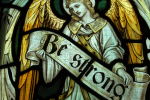December 3, 2014
Why Pray At Church Meetings?
 The answer to the title’s question might seem completely obvious to you. Maybe I should’ve made it more controversial. Try this: “Stop Praying (like you’ve been doing) at Church Meetings!” More to the point, I’m suggesting we might benefit by thinking about precisely why and how we pray at church meetings.
The answer to the title’s question might seem completely obvious to you. Maybe I should’ve made it more controversial. Try this: “Stop Praying (like you’ve been doing) at Church Meetings!” More to the point, I’m suggesting we might benefit by thinking about precisely why and how we pray at church meetings.
It is or at least should be relatively obvious why we do. We actually believe that God the Holy Spirit is a partner with us in our work of discernment, and being a member of Christ’s own body means, by definition, that our deliberations are a part of the dynamic of the Holy Trinity itself. Prayer is one way to name that mystery.
It’s just that, sometimes, prayer at church meetings is little more than an add-on (“Okay, let’s get started. Who wants to lead us in prayer?...”) or, equally bad, an agenda pusher itself (“Dear God, help this miserly vestry who seem happy with being habitual penny-pinchers to understand that you are abundant and they really need to cough up for more spending …”) Technically speaking, that is a prayer.
Or consider these two real-life examples.
- Years ago, a diocesan official told me that the official policy was that all meetings shall begin in prayer because, in her words, “Praying before a meeting helps calm people and, doing so, leads to shorter, more focused conversations.”
- Another time, someone in our community came to our vestry with a sensitive issue. She asked if she could offer prayer before her remarks and she did, using the collect ‘For a Church Convention or Meeting’ in the back of the Prayer Book (p. 818). Following her remarks, she and a vestry member got into a back-and-forth, at which point the petitioner abruptly got up in a huff and stormed out of the room. Walking out of the room, nearly in tears, she was last heard to say, “But I opened the meeting in prayer…”
I don’t really have an answer to this question; just that I think it’s an important one to ask, and ask again, and keep asking. There are those vestries and leadership bodies who spend a great deal of time in prayer, some following structured liturgies such as Evening Prayer or Holy Eucharist or Compline. There are those who dwell in scripture and bible study a great deal before the business begins. Still others shape their entire meeting around the course of those Prayer Book services.
Those are wonderful techniques and theologically sound, as well. I’m just not sure that technique is the same as being truly present to God and one another, in just the same way that I’m never certain that staying the course and sticking to the agenda is more or less important than being attentive to where and how the Holy Spirit is moving around that table, in that room, on that night. If prayer is an ongoing conversation with God, and God with us, it might do well to stop prayinglike we have been doing at church meetings. It will be of benefit even more so to consider how and in what ways we are truly praying, even engaging that mysterious injunction of St. Paul who told the Thessalonians to “pray without ceasing” (1 Thess. 5:17).
Don't miss a blog post! Subscribe via email or RSS, using the grey box on the upper right.





